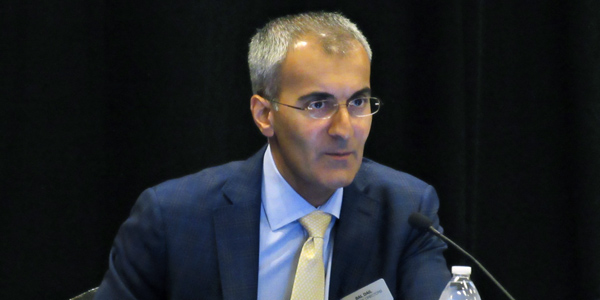By Amanda Durish Cook
BRANSON, Mo. — MISO wants to spend $130 million over the next five years to construct a new market platform before its existing one becomes outdated, but its Board of Directors is insisting on a thorough stakeholder review of the project’s cost.
Jeff Bladen, MISO executive director of market design, said the upgrade would involve a “piece-by-piece replacement of components” resulting in a “far more modular platform” compared with the rigidity of the current system, which hinders market changes.
Swapping out market software incrementally instead of introducing a new platform all at once is the safer option, Bladen said.
“The risk of a misstep is far less using an incremental process,” he said during a rare June 20 joint meeting of the board’s Markets and Technology committees.
MISO’s current platform is “inflexible,” and even simple market changes require testing and retesting because of possible effects on other software, according to MISO Technology Executive Kevin Caringer. He likened the new design to Microsoft PowerPoint, which can recognize and accept fonts and graphics from other sources.
Looming Obsolescence
The RTO evaluated its market system last year and concluded it had five to seven years before evolving cybersecurity standards and increasing market complexity render the system — designed in the late 1990s — obsolete and no longer able to clear the day-ahead market. (See MISO Reaffirms 2023 End Date for Market Platform.)
“The time is now to begin long-term investment,” Bladen said. “Findings and conclusions drawn from the evaluation resulted in a clear call to immediately initiate a system upgrade.”
Caringer said MISO will spend about $3 million on cybersecurity to extend the life of the current platform for the five years needed for the switch to a new platform.
MISO is asking for an additional 25% contingency budget for unforeseen expenses in addition to the expected $130 million plan. Staff said it will present final cost estimates to the board in September. The board’s Audit and Finance Committee will decide whether to approve the spending in October, and a full board decision on the budget is set for December.
MISO staff predicts the project will yield a 4-to-1 return on investment, with $201 million in benefits, $254 million in cost avoidance and $111 million in risk mitigation.
Board Scrutiny

Director Baljit Dail asked how MISO will prove the benefits and savings to its stakeholders.
Bladen said the RTO can share a recent benefits report once it removes nonpublic information from the document.
“I don’t want this to be jammed into December. At some point, I’m going to ask, has this report been scrubbed and has it been shared with stakeholders? I don’t want that to happen in December,” Dail warned.
Director Paul Bonavia wondered if MISO will give stakeholder groups a chance to collaborate to develop a process for responding to the benefits report.
Bladen responded that MISO expects to follow its normal annual budget process with stakeholder review occurring in the Finance Subcommittee.
“I appreciate that, but the budget process usually doesn’t have $130 million to $160 million in additional spending. One director’s strong counsel to you all is make sure the usual process can handle [this],” Dail said.
Other directors pointed out that the project’s benefits may play second fiddle to the market failure that looms if MISO does not implement a new market platform.
“I’m not too captivated by the benefits. We need to move,” Director Michael Curran said. “I’d love to see the benefits, but we have to spend the money. … It’s a burning platform; it’s a slow burn, but it’s coming.”
“My comment is, however you want to justify the benefit, it needs to be put before the stakeholders,” Dail replied. He suggested that MISO convene a special stakeholder committee to discuss the investment and consequences of not reconstructing the market platform.
“I’d like to see [the stakeholders’] fingerprints all over this,” Curran agreed.
Bladen said MISO could initiate stakeholder workshops to discuss building the platform.
In response to a question from Curran, Caringer said MISO could reach out to developers of its original market platform to help improve the transition. Some longtime MISO employees also have knowledge of the system, he said.
Curran said he wanted to require any potential project vendors to have contact with developers of the original system. CEO John Bear said the board would address that topic in a closed session that immediately followed the meeting.





